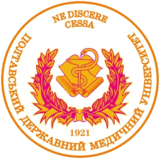Please use this identifier to cite or link to this item:
http://repository.pdmu.edu.ua/handle/123456789/15762| Title: | Infectious complications of acute pancreatitis: spectrum of causative agents and approaches to antibacterial therapy |
| Authors: | Dolzhkovyi, S. V. Cherkun, O. Yu. Sheyko, V. D. Kasian, V. V. Hryn, V. H. Должковий, Сергій Вікторович Черкун, Олексій Юрійович Шейко, Володимир Дмитрович Кас'ян, Володимир Володимирович Гринь, Володимир Григорович Должковой, Сергей Викторович Черкун, Алексей Юрьевич Шейко, Владимир Дмитриевич Касьян, Владимир Владимирович Гринь, Владимир Григорьевич |
| Issue Date: | 2021 |
| Publisher: | Heirourgike Etaireia Boreiou Ellados, Greece |
| Citation: | Infectious complications of acute pancreatitis: spectrum of causative agents and approaches to antibacterial therapy / S. V. Dolzhkovyi, O. Yu. Cherkun, V. D. Sheyko [et al.] // Surgical Chronicles. – 2021. – Vol. 26, issue 1 (Junuary-March). – Р. 22–25. |
| Abstract: | The aim of this study was to determine optimal regimes of antibacterial therapy on different stages of acute pancreatitis (AP) clinical course and susceptibility of causative agents, which cause AP infectious complications (IC), to antibiotics. 119 patients with severe and moderate AP were enrolled to the study. The I group was formed from 57 patients (treated during 2015-2016 years). The II group included 62 patient (treated during 2017-2018 years). Antibiotics from reserve group were used for infectious complications’ prophylaxis in the I group. Broad-spectrum antibiotics were administrated in the II group. There were no statistically significant difference in the arise of IC (I group – 24,5%; II group – 25,8%; p=1,0). Associations of microorganisms were found in 18,5% samples in the I group and 47,4% in the II. There were 23,8% antibiotics with sensitivity more then 50% in the I group and 19,2% in the II. 10,0% of IC causative agents produced extended spectrum beta lactamases (ESBL) in the I group. In the II group there were 29,6% ESBL-producing microorganisms. Causative agents of IC in patients with AP are in majority microorganisms, which are resistant to several antibiotics. This characteristic of microorganisms does not depend on type of drug, which is used for prophylactic antibiotic administration during early stages of AP clinical course. The increase of ESBL producing bacteria, Gram-negative bacteria and microorganisms’ associations among IC causative agents is observed. Administration of antibiotics from reserve group in case of IC occurrence is recommended. |
| Keywords: | acute pancreatitis infectious complications causative agents |
| ISSN: | 1108-5002 (print) |
| URI: | http://repository.pdmu.edu.ua/handle/123456789/15762 |
| Appears in Collections: | Наукові праці. Кафедра анатомії людини |
Files in This Item:
| File | Description | Size | Format | |
|---|---|---|---|---|
| 2021_DChShKH_Surg_Chron.pdf | 283,37 kB | Adobe PDF | View/Open |
Items in DSpace are protected by copyright, with all rights reserved, unless otherwise indicated.



